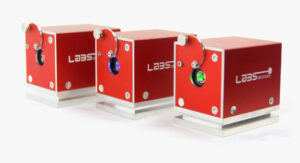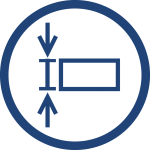Introducing the DLnsec

A state-of-the-art light source
Diode laser systems delivering nanosecond light pulses on demand like the DLnsec™ are state of the art technology.
Only a few devices on the market are available that deliver such short laser pulses. Many of them are either using resonant circuits and are thus only able to deliver fixed length / fixed frequency pulses or are much slower and can only produce pulses on the order of tens of nanoseconds or with limited bandwidth. The alternatives used if arbitrary pulse lengths and high repetition rates are required are often cw-laser sources like frequency doubled DPSS lasers with an external acousto-optical modulator. Such systems however have a lot of disadvantages: they are bulky and expensive and need frequent maintenance in the form of re-alignment. And even when set up and maintained well, their on / off extinction ratio is usually limited to 40-60 dB.
Small and versatile
The DLnsec™ overcomes these drawbacks. It represents a reliable source of arbitrary laser pulses from even sub-nanosecond duration to cw with rise- and fall-times on the order of or below one nanosecond and repetition rates of tens of Megahertz. Their extinction ratio is virtually infinite.
They require only 36 square centimetres of space on your optical table and come with a load of mounting options like M4 and M6 threaded holes in the baseplate and a groove around it to make them compatible with standard clamps. These features allow easy integration into any existing optical setup.
Made by professionals for professionals
The DLnsec™ is made by professional scientists for professional scientists. The experience of almost 15 years of scientific work with cutting-edge technologies in experimental quantum optics and six years of professional experience in the design of electronic instruments for scientific measurements have flown into the design of this laser system.^
All this experience is integrated into a tiny aluminium box of approcimately 7x5x6 cm³. Really all of it: the DLnsec™ does not even require an external driver. The whole electronics is miniaturized such that it fits into the small box – with all its features.
Fast trigger and sync
These include an internal trigger source that can be used if pulses don’t have to be shorter than 50 ns and rep-rates not higher than 62 kHz. If you want it fast, the DLnsec™ can be triggered by an external TTL source. Independent of the source used to trigger the light pulses, the DLnsec™ comes with a synchronous LVTTL output. This signal is triggered by the internal current pulse driver circuit and has only a very short delay of a few nanoseconds with respect to the emitted light pulse with jitter on the order of only a few tens of picoseconds. This allows triggering measurements very precisely on the emitted light pulse.
Ease of use
The laser’s user interface is very simple. All its functions are software-controlled via plain text commands over USB. The control and programming are thus completely platform and software independent and you can use any programming language that is able to send plain text via a virtual serial connection. This makes it extremely easy to integrate the DLnsec™ into existing software environments. We and our customers have already used many different languages like Python, Matlab, LabView as well as simple terminal emulators like PuTTY on different operating systems to control the DLnsec™. Even a usual smartphone can fully control the DLnsec™ if it supports USB-OTG.
Custom solutions
Although the 520 nm / 80 mW version is our most wanted, we build laser systems on our customers’ demand’ with the specs required for their experiments. We can customize systems in the visible range from 400 nm to 520 nm and from 630 nm to 780 nm and in the NIR range from 780 nm to 1500 nm. Possible output powers and fiber coupled options depend on their availability on the market. Talk to us!
Affordable
Finally, this all comes for a very affordable price. Ask for a quotation. Simply write us an email: sales(at)labs-electronics.com.






